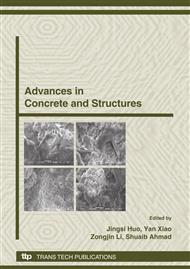p.409
p.415
p.421
p.427
p.433
p.441
p.447
p.453
p.459
Experimental Study on Cracking Property of Self-Compacting Concrete
Abstract:
Taking free shrinkage as the key parameter in evaluating cracking of concrete, the cracking properties of self-compacting concrete with strength grade of C35 and C50 were investigated based on ring and slab restraint tests. Meanwhile, the ultimate tensile strain of self-compacting concrete was studied by using flexural test. Experimental results show that the shrinkage of self-compacting concrete is lower than that of normal concrete. Self-compacting concrete cracks later than normal concrete with the same strength grade. Although the ultimate flexural tensile strains of self-compacting concrete in 7 d and 28 d are a little bit lower than that of the normal concrete, it can still be concluded from the research that the cracking property of self-compacting concrete can be greatly improved by using proper mix proportion.
Info:
Periodical:
Pages:
433-438
Citation:
Online since:
October 2008
Authors:
Price:
Сopyright:
© 2009 Trans Tech Publications Ltd. All Rights Reserved
Share:
Citation:


